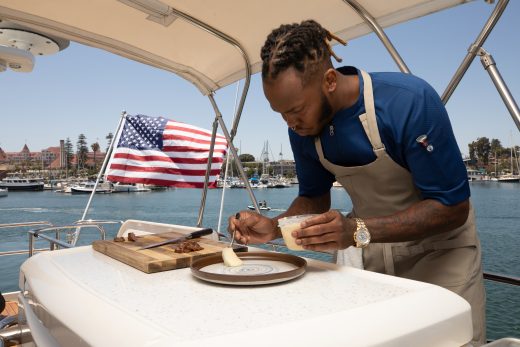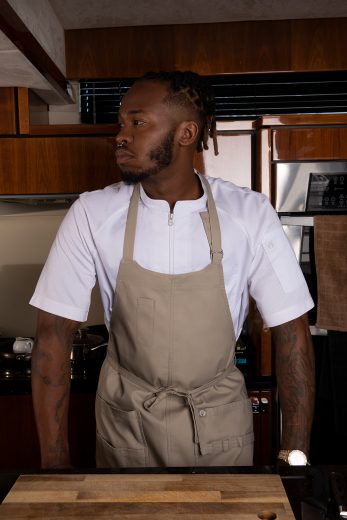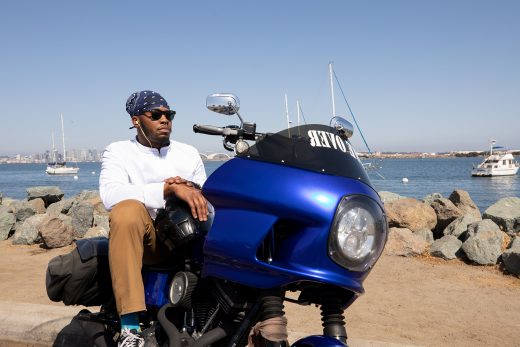Chef Kelston Moore is a private chef who delivers one-of-a-kind dining experiences in San Diego. He’s also the co-founder of Bad Boyz of Culinary, a nonprofit that gives Black chefs the tools to grow within the culinary industry. We had the opportunity to sit down and talk about all the things, from growing up in Barbados to integrating chefdom and fatherhood in a time-intensive career.
Chef Works: You’re a father and chef working within an industry that requires a lot of time away from your family. How do you manage and what’s your take on the balance of the two?
Kelston Moore: I’m actually starting to learn it a whole lot better now. I try to include my son in a lot of things that I do, especially grocery shopping for my clients or for the yacht. That way, I don’t have to find a babysitter to watch him, and it gives him the opportunity to learn. It can be hard to have sit-down, one-on-one teaching time with him, so I incorporate it into my life with cooking.
When I go to the store, I’ll say, “Hey, grab me two broccoli,” or “three broccoli.” Things like that. And then, I let him navigate around the grocery store on his own, while still keeping an eye on him. That way, he’s learning and I’m still able to give him that quality time he needs. He really likes the fish department, looking at all the fish and their eyes, and asking questions. So, I incorporate teaching that way. I call it being a “chef dad,” which is using the tools that I know to teach him.
CW: Your line of work can be difficult and requires quite a bit of troubleshooting and quick thinking — what’s your daily mindset going into it?
KM: When I wake up in the morning, I give myself time to just lay in bed. That’s normally my time to do whatever — scroll on social media, check my email, respond to text messages, and just be a normal person. Then once I get up, it’s just GO time. I normally do shopping the day of, because I don’t like to drag stuff out. I’d rather get in and be focused 100%. I do my shopping, do my prep, hit the yacht, organize, cook, clean, get off the yacht, maybe hit the bar for beer with the crew, and then go back home to plan for the next day.
It’s kind of like a structure/routine kind of deal, which derives from being in the US Navy. I’m slowly changing that because I’m getting a lot of bookings, so I have to be more prioritized and time managed. I’m working on not doing everything too last minute and on-the-go. I will say that I like structure, though. Having structure and repetition helps me become better at whatever I’m doing. Sometimes it works out and sometimes it doesn’t, you know? And if it doesn’t, I have to think on my feet and figure out how to get through it. Problem solving and creativity are important in what I do. You can plan out as much as you want, and then something happens where you have to think outside the box and in that moment.
CW: Describe a “tool” that you possess that helps you in your work — but isn’t physical. What’s its value?
KM: Maybe a calendar, but I’m old school and still use a big white board calendar in the middle of my vision wall. But, I’m learning to get better with my phone calendar — it’s been a lifesaver.

CW: They say this industry weeds out everyone that lacks true passion for the craft. What keeps you invested in and dedicated to the culinary space?
KM: First, my son. Then, seeing the reaction of the guests’ faces when they eat and being able to put my story into my dishes of where I’m from. My son always tells me, “Daddy, you’re a great chef. You’re a great dad. You’re a great dad-chef.” We could be watching TV, and it’s so random when he says it. But it makes me smile, knowing that after all these years and these long days, someone appreciates what I do.
CW: Can you describe some of the stories that you like to infuse into your work?
KM: Really the story between me and my dad. Looking back on our relationship, I used to think, “Man, he’s never around.” I didn’t know he was working in his own way to provide a life for me and my sister, especially as immigrants to the United States. So, I like to tell the story of how I’m better connected with my dad now.
My dad came out here for my birthday, and he was sitting around the dinner table with all my chef friends, talking about food. The way he described certain foods and his love for food growing up was shocking. I was like, “Dude, I never knew any of this!” I’m starting to appreciate the relationship I have with my dad more than ever, especially since having my son. It reminds me of all the food I ate growing up and how my dad put in time and effort to provide a life for us. No matter what was going on, he still made sure everyone else was fed and still took care of his family.
CW: Does your father have a culinary passion, too? Or, is it more of his spirit that inspires you?
KM: My dad was a waiter at the Almond Beach Resort back in Barbados — closed down, so it’s now Sandy Lane Resort. After work, he would just come home and cook to sell food to the people in the neighborhood. In Barbados, we call it a kickback where we’d barbecue or whatnot, and he would sell plates. If someone didn’t have enough he would give them the amount in food for whatever money they had, whether it was $1 or $2. He did that to provide extra money on top of being a waiter.
And then he came to the United States, and he was still cooking. He wasn’t cooking for business — he was cooking because we were in the United States and that was the only way to remind us of home. So, we would still have the Sunday dinners with my aunt, uncle, and cousins, where we’d sit down, we’d pray, we’d pass the food around. I think my dad always wanted to cook professionally, but he couldn’t because he had to provide.
CW: You have a nonprofit. What is its name, the foundation of its creation, and its core functions as you see it?
KM: It’s called Bad Boyz of Culinary, which I co-founded with one of my chef colleagues. For me, it was one of those things where I didn’t get a lot of help that I needed (or thought that I should’ve gotten) coming up in the chef game. I’d reach out to a lot of chefs, and they wouldn’t even respond — some still don’t. I feel as though that’s the problem in the community: that we fail to help each other out. I always tell people this: “I can give you any recipe down to a ‘T.’ But it’s harder to replicate the way I move my wrist or the way I come back and check on the heat.” So why not just share that knowledge? The reason we started Bad Boyz of Culinary is because there was really no community within the chef community in San Diego. It was like everybody was out for themselves.
Chef Quinnton Austin brought me on and taught me a few things. Actually, my crab cake, which is what I got known for here in San Diego — Chef Quinnton is the one I hit up when I needed help with my ingredients. I was like, “Hey, I need help. This crab cake is falling apart. Tell me what I can use as a binding agent.” And he gave me the insight without expecting anything in return. I think that it takes a lot for someone to humble themselves and ask for help, and if it’s within our means to help, we should do so. I’m not talking about just monetarily. But if they want to better themselves in their career, and you have the knowledge to help, why not? That’s the reason we started it. We highlight African American chefs and create awareness through special programs, events, mentorship, and scholarships. I believe that those are the things that are needed when people are starting out. Even providing a knife, apron, or cutting board can help someone get a little further in their journey.
We did a culinary competition back in February called “The People’s Choice Culinary Showcase,” where the chefs had never worked in a restaurant, and thanks to the competition, they got the feel and vibe of restaurants and how the culinary world works. We also paired each participant with an experienced chef to add in the mentorship aspect, too. It was like, “Hey, I know you’re used to putting mashed potatoes on a plate like that, but let’s thin it out with a little bit more milk and cream, and make it a purée. That way, it’s smooth and looks presentable, because people eat with their eyes.” That’s what’s needed in the industry, making junior cooks and chefs more comfortable with asking and accepting help.
CW: Who and or what has supported you in your journey? Name individuals, business, and/or organizations that support you in any notable way. Take a second to shout them out.
KM: I will say my buddy, Joe. His name is actually Atley, but we call him Joe. I met him back in 2014, in Hawai’i, when we were stationed together on the USS Port Royal. He’s from Trinidad, and I’m from Barbados… you know, island boys stay together. At the time, I was young and hard-headed, and Joe convinced me to get my stuff together. He really helped me grow to be more mature. We would hang out for hours after work in my garage with just two lawn chairs because I had no furniture. When I got out, he retired. He’s been the brains behind everything I’ve done since I left the military in 2018.
Even going back to my photography days when I was doing photography and video. He’s been in every aspect — my website, my Instagram, every phone call, every conversation with clients, pricing, everything. He’s always been there. He’s my web designer, consultant, and even my social media manager sometimes. He doesn’t ask for a lot of credit — but thank you, Joe, you have been a real one and I owe all of this to you. Thanks for always having my back. Love you, brother.

CW: Chef Works is so grateful to be able to accompany you in your journey. You, your story, and everything you’ve accomplished in this space are now part of our collective narrative. At this moment, can you describe what it means to you to be a part of this partnership as we continue to move forward and write new futures?
KM: It’s definitely life-changing. Before I even knew what Chef Works was, I wore the brand as a cook in the Navy. It was literally like these checkered pants with this blue chef coat — that’s what we wore in the galley in Hawai’i. Fast-forward almost 10 years, and I’m now working with this brand. It’s like meeting your favorite celebrity growing up. I never thought that I’d be a chef, cooking on a yacht, or working with Chef Works. It’s mind-blowing.
One of my favorite quotes is, “The heart of the man and the soul of the island is the perfect recipe for great cuisine.” Everything I’ve been through in my life, it was all meant to come together. My being from Barbados, an immigrant to this country, working hard… and my dad who wanted to do this, but couldn’t. Now, I get to do it. I came up here on the opportunity that most didn’t have. I’m not saying my life is better than other people’s, but I’m just now realizing the opportunity I’ve been given. It’s like, “I’ve been blessed, so let me capitalize on that. Let me be more appreciative, do what I need to do, and focus.”
CW: Is there anything you’d like to add?
KM: I want to just say to any other chefs out there, don’t give up. Don’t give up. Just keep pushing forward, because bad days don’t last long, and always remain a student.
Chef Kelston wears the Arcadia chef coat in white, part of the all-new FLEX collection. Visit chefworks.com/flex to buy!
Follow Chef Kelston on Instagram at @chefkelston.



